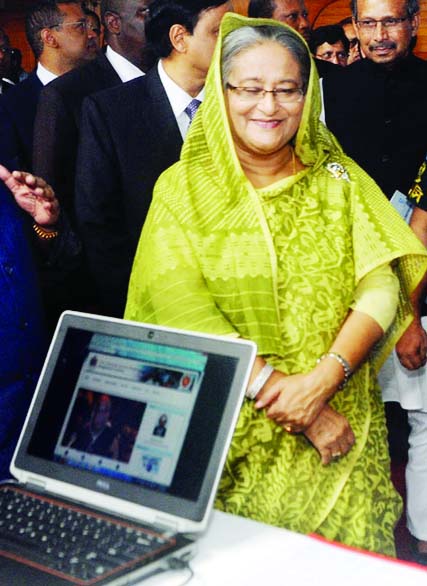
Prime Minister Sheikh Hasina on Sunday underscored the need for increased cooperation among the countries both in the South and the North in various areas of development as the South alone cannot make progress.
“The South cannot make progress alone while they have significant barriers like resource scarcity, low technical expertise, inadequate infrastructure, institutional incapacity, weak financial management system, non-functional legal and regulatory framework and internal strife. So, cooperation of the North can remove many of these barriers,” she said.
The Prime Minister was speaking at a two-day high-level meeting on ‘South-South and Triangular Cooperation in the Post-2015 Development Agenda: Financing for Development in the South and Technology Transfer’ at Sonargaon Hotel.
The Prime Minister further said, “Cooperation among the Southern countries especially in trade, food security, higher education, skill development, healthcare, conservation of natural resources, renewable energy, foreign direct investment, capital market development, creating global public goods and scientific research and development is urgently needed.”
Laying emphasis on finding ways for financing development activities by the Southern countries, Sheikh Hasina also called on the developed countries not to replace the official development assistance which the North is committed to proving under internationally agreed decision.
In this connection, she mentioned that centres of excellence established in different southern countries for research and development purposes which may play a vital role in qualitative expansion of the South-South cooperation.
“Development solutions and knowledge being generated by the centers of excellence should be affordable and made available to share and replicate,” Hasina said adding that development solutions can be customised to country-specific needs and situation.
She said, the critical advanced knowledge and enhanced capacity which are much needed by the southern institutions or centers of excellence could be provided under Triangular cooperation.
AK Abdul Momen, President of the General Assembly High-Level Committee on South-South Cooperation and Permanent Representative of Bangladesh to the United Nations, Jeremiah Nyamane Kingsley Mamabolo, Permanent Representative of the Republic of South Africa to the United Nations, George Wilfred Talbot, Permanent Representative of Guyana to the United Nations, Yiping Zhou, Envoy of the Secretary-General on South-South Cooperation, Director of the United Nations Office on South-South Cooperation and Rintaro Tamaki, Deputy Secretary-General, Organization for Economic Cooperation and Development (OECD) also spoke at the inaugural session.
“The South cannot make progress alone while they have significant barriers like resource scarcity, low technical expertise, inadequate infrastructure, institutional incapacity, weak financial management system, non-functional legal and regulatory framework and internal strife. So, cooperation of the North can remove many of these barriers,” she said.
The Prime Minister was speaking at a two-day high-level meeting on ‘South-South and Triangular Cooperation in the Post-2015 Development Agenda: Financing for Development in the South and Technology Transfer’ at Sonargaon Hotel.
The Prime Minister further said, “Cooperation among the Southern countries especially in trade, food security, higher education, skill development, healthcare, conservation of natural resources, renewable energy, foreign direct investment, capital market development, creating global public goods and scientific research and development is urgently needed.”
Laying emphasis on finding ways for financing development activities by the Southern countries, Sheikh Hasina also called on the developed countries not to replace the official development assistance which the North is committed to proving under internationally agreed decision.
In this connection, she mentioned that centres of excellence established in different southern countries for research and development purposes which may play a vital role in qualitative expansion of the South-South cooperation.
“Development solutions and knowledge being generated by the centers of excellence should be affordable and made available to share and replicate,” Hasina said adding that development solutions can be customised to country-specific needs and situation.
She said, the critical advanced knowledge and enhanced capacity which are much needed by the southern institutions or centers of excellence could be provided under Triangular cooperation.
AK Abdul Momen, President of the General Assembly High-Level Committee on South-South Cooperation and Permanent Representative of Bangladesh to the United Nations, Jeremiah Nyamane Kingsley Mamabolo, Permanent Representative of the Republic of South Africa to the United Nations, George Wilfred Talbot, Permanent Representative of Guyana to the United Nations, Yiping Zhou, Envoy of the Secretary-General on South-South Cooperation, Director of the United Nations Office on South-South Cooperation and Rintaro Tamaki, Deputy Secretary-General, Organization for Economic Cooperation and Development (OECD) also spoke at the inaugural session.

